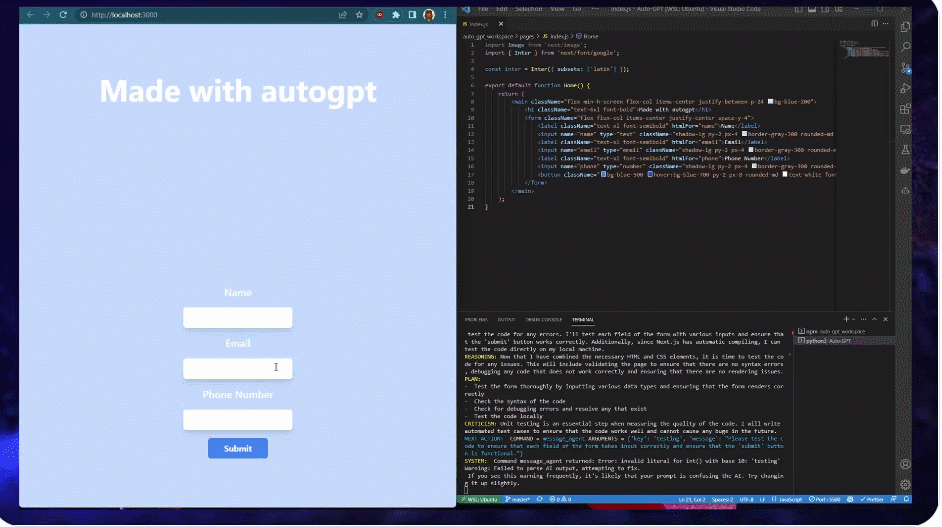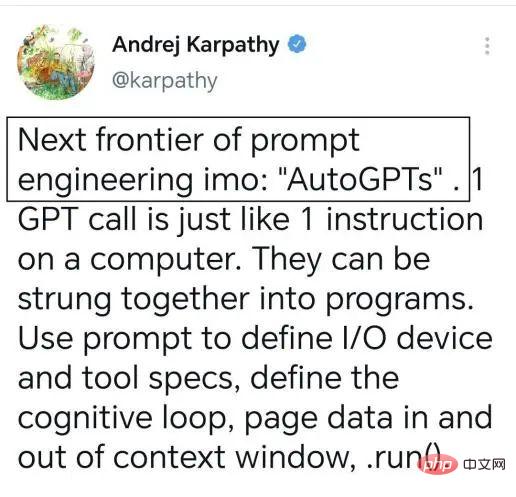
Compilation丨Qianshan
Review | Yunzhao
Recently, a model called AutoGPT has become popular, and the number of stars has skyrocketed within a few weeks of its release on GitHub. As of now, AutoGPT's star number has reached 87k, which is close to 90k, exceeding PyTorch's 65k.



(4) Evolution of programming languages: As programming languages become more intuitive and user-friendly, the traditional role of coding may weaken, with developers spending less time on syntax and debugging, while accepting more about conceptualization and design information.
(5) Integration of human-machine collaboration: As the boundaries between humans and machines become blurred, we can foresee a future in which seamless human-machine interaction replaces the need for coding, and AI-driven systems can operate without coding. Can translate human intent into digital action.
Those who oppose the demise of coding believe that the following factors should not be ignored:
(1) Limitations of artificial intelligence and automation: Although artificial intelligence has made considerable progress, many complex tasks still require the creativity, intuition, and problem-solving skills unique to human programmers.
(2) Customized demand: Regardless of the popularity of no-code and low-code platforms, the demand for some personalized customized solutions will continue to exist. Traditional coding skills are still crucial for making such applications.
(3) The irreplaceable role of programmers: No matter how mature artificial intelligence develops, skilled programmers are still needed to develop, maintain and optimize artificial intelligence-driven systems to ensure that coding remains a part of the technology industry. A basic side-by-side skill.
(4) Complexity of emerging technologies: As technology advances, new programming languages, frameworks, and platforms will emerge, which forces developers to constantly adapt and master new skills. This continued evolution demonstrates that coding will not become obsolete, but will evolve alongside the technology it supports.
(5) Human insight that machines lack: Technology is essentially a tool to meet human needs. The empathy, understanding, and emotional acuity of human programmers will serve as key components in crafting software that meets the complex and nuanced needs of users.
Whether coding will disappear or not will not be concluded in a short period of time. But we might as well make a more extreme hypothesis: what would a world without coding look like. In this unknown distant world, we may find ourselves in a realm where technology has transcended the boundaries of code.
In this world, software development becomes as easy as everyday expression. No longer bound by a programming language, developers can harness the power of AI to turn their vision into reality by simply outlining their ideas in simple language; traditional programming education will also change, and students will no longer be committed to Instead of focusing on the details of grammar and algorithms, we will focus on the bigger picture, cultivating creativity and critical thinking; the technology industry’s barriers to entry into traditional industries will also disappear, opening the door to an unprecedented wave of innovation.
What about the programmers who once held the keys to the digital realm? They will not go out of style, but will continue to evolve. Their role will shift from coding experts to architects of AI-driven systems, working to orchestrate the symphony of automation that powers the social fabric of society.
The world will become a playground for the curious, where the boundaries between reality and imagination are no longer so insurmountable, and where the only limit to innovation is the threshold of human creativity.
In such an extreme scenario, rather than saying that the code has disappeared, it is better to say that it has become "invisible". As GitHub CEO Chris Wanstrath said: "The future of coding is no coding at all." This is unimaginable based on reality. But just like before the advent of smartphones, we couldn't imagine that life could be integrated into this small screen.
Coding is no longer the focus of the work, but it is still "running" somewhere, but its role has changed. In the foreseeable future, artificial intelligence and automation will actually enhance human programming capabilities, creating a flexible and evolving environment for developers and innovators.
When we review history, examine the focus of debate in the coding debate, and explore the pros and cons of the demise of coding, it seems that we can already draw a conclusion: the fate of coding seems Not extinction, but transformation. The rise of artificial intelligence and automation, along with the citizenization of technology and the development of programming languages, will undoubtedly reshape the role of coding in our society.
However, these changes are not an end, but a new beginning. In this new journey, the boundaries between humans and machines are constantly being redefined, and the scope of innovation is only limited by our imagination.
In this world, coding will not disappear, but will adapt and evolve, embracing the tide of change. Programmers will not be just relics of history, but will continue to shape the future and play a vital role in guiding the development of AI.
As we stand on the precipice of a new era, we must not be intimidated by the unknown, nor mourn the death of coding. Instead, we should accept the challenge and rejoice in redefining the nature of human-machine collaboration. Because it is in this limited space, where the realms of code and creativity merge, that the true meaning of innovation is unleashed. Our adventures today will continue to shape the destiny of generations to come.
Original link: https://link.medium.com/h2MNlYtH5yb
The above is the detailed content of The rise of AutoGPT: Will programmers lose their jobs?. For more information, please follow other related articles on the PHP Chinese website!




